- Home
- Linwood Barclay
Bad Move zw-1 Page 8
Bad Move zw-1 Read online
Page 8
The front door of Trixie’s house opened and a well-dressed man, mid-fifties I’d guess, came out. He was a bit tentative about it, glancing out to the street as he did so. He reached into his pocket for his keys, unlocked the Lexus with his remote, then strode quickly from the front door to the car. As he did so, his eyes happened to lock on mine.
“Hi!” I said. I may have my faults, but I’ll always say hello to people.
He looked as though I’d just shot him with a dart. He quickly got into the car, where he was obscured by heavily tinted windows, backed out onto Greenway, then headed down the street, the Lexus making a deep, throaty roar the whole way.
The guy looked rattled, no doubt about it. Maybe Trixie’d told him he was going to have to pay a lot more in taxes than he’d budgeted for. Maybe he’d have to turn in the Lexus.
If he was rattled, maybe Trixie was, too. Maybe this was a bad time. I went back into the house.
I was actually working when Sarah got home. Not building a kit. Not flying a model of the starship Enterprise around my study, humming the theme from Star Trek. Not playing Star Wars computer games. I was working on the last chapter when I heard Sarah unlock the front door and come in.
I didn’t call out. I didn’t know whether she was still angry with me about the keys thing. But I started hitting the computer keyboard with more intensity, so she’d know I was home, hear where I was, and possibly think I didn’t hear her come in because I was consumed with work. Soon, there was some racket coming from the kitchen, where it sounded as though she was putting away some food, and then it was very quiet, save for the sound of my typing. Although shortly before her arrival I’d actually been writing, I wasn’t, at that moment, being overly creative. What I’d typed since I’d heard Sarah’s key in the door was “Sarah’s home so I better sound busy and it sounds like she’s inside the house now and she’s going into the kitchen and she must have bought something for dinner and I hope it’s something good because it’s just occurred to me that I’ve eaten nothing this afternoon what with finding a dead guy which can have something of a negative effect on your appetite and”
And then I could sense her presence behind me. I work with my back to the door, which means the screen is visible to anyone walking in, but fortunately, Sarah doesn’t have telescopic vision like the Superman statuette up on my shelf.
“Hey,” she said, standing in the doorway.
I whirled around in my computer chair. “Hi.”
“Sounds like it’s going really well,” Sarah said. “I didn’t know, after what happened to you today, whether you’d feel like working.”
I shrugged, clicked the mouse in the upper right corner and made the text vanish from the screen. “I only got back to it in the last hour or so. Got an e-mail from Tom that kind of encouraged me to get going.”
I turned back to the computer and heard Sarah come up behind me. She rested her hands on my shoulders.
“I was wondering if we could be friends,” she said.
I didn’t say anything.
“I picked up some fettuccine and some chicken, thought I’d make us something nice for dinner.”
I hesitated. “Sounds nice,” I said.
“And just so you know, not only did I take the keys out of the door, I set them on the table, and locked the door behind me.”
I definitely said nothing.
“You know what that means?” she asked. She slid her hands down more so that they were rubbing across my chest.
“What does that mean?”
“It means we’re locked in the house, and I think we’re all alone.”
“The kids will be home any time now, I think.”
“Why don’t we give them twenty bucks for pizza, tell them to get out of the house, and after I’ve made you some dinner, maybe we could mess around.”
I spun around slowly, nuzzling my head between Sarah’s breasts. They were very nice breasts. “That might be nice,” I said. “That might be very nice.”
Sarah slipped her arms around my head, drawing me in even closer, if that was possible. “I don’t know how much work you’ve got left here, but I’ll have dinner ready in about twenty minutes. Okay? And then you can tell me more about finding that man’s body. That must have been awful.”
I came up for air and looked into her face. “I’m sorry for being such a jerk. With the keys, and the car, and everything.”
Sarah smiled. “You can’t help yourself.”
“Possibly.”
And she bent down and kissed me, a quick peck at first, then a longer, more exploratory kiss, with her long dark hair spilling across my face, that hinted of much better things to come. She untangled herself from me, smiled, and left for the kitchen while I swiveled back around, made an adjustment in my jeans, and brought my chapter back onto the screen. I deleted the parts I’d written since Sarah’s arrival, then reread the last few paragraphs before that to reacquaint myself with where I was in the story.
A few moments later, from the kitchen, Sarah said, “Shit!”
I jumped up and ran in to see what was wrong. A chunk of drywall, about the size of a paperback, had fallen from between the pot lights, in that spot where the shower water leaked down. It had landed on the just-opened package of fresh pasta.
7
My first instinct, in the hours following the discovery of Spender’s body, even without knowing exactly how he’d died, was to give everyone a security lecture. Don’t talk to strangers or pick up hitchhikers, make sure you haven’t left the keys in the door, make sure you throw the deadbolt, obey your “walk” and “don’t walk” signals, don’t use the electric hair dryer while you’re sitting in the bathtub, wait an hour after eating before swimming, never run with scissors.
But I sensed this was the wrong way to go. It had only been a couple days since the hidden car incident, and now that Sarah and I were speaking to each other again, I didn’t want to set things back. My goal was tolerance. I would not let things get to me. I would let things go. Like water off a duck’s back. I’d stop telling everyone how to behave. I’d mellow out.
I’d learn to chill.
When Paul and Angie got home, I told them what had happened down by the creek. Angie said, “Are you sure the guy was dead? Maybe he was just pretending to be dead to teach you a lesson about safe hiking.” Then she ran for her camera and persuaded her brother to come with her so she could take her first pictures of a crime scene. On their way out, Sarah shoved a twenty into her hand and told her to buy her brother and herself some pizza for dinner, and to eat it at the restaurant, not bring it home.
“Oh God,” Paul said under his breath to his sister. “They’re going to go at it.”
After Sarah and I had picked the drywall out of our fettuccine, and had dinner, Paul’s worst fears were realized. There’s nothing like brushing up against death to reinvigorate the lovemaking process. My disposition was definitely improving.
My resolve to be less of a know-it-all jerk was tested early the next morning, when I found the front door unlocked. Once Angie and Paul had returned from dinner, Paul had gone back out with his friend Hakim, sneaking from one movie to another at the multiplex, buying tickets for a PG show and then slipping into the theater showing an R-rated slasher pic where women with heaving bosoms kept falling down while trying to run away, so he wasn’t in until after midnight. When I went down in the morning to get The Metropolitan, the bolt on the door hadn’t been turned. And there, sitting within an arm’s reach of it, was Sarah’s purse. I nearly mentioned it to him at breakfast, but didn’t. Next time, I’d just wait until Paul was home and go down and check the door myself.
Paul left for school at the regular time, but Angie hung in, going downstairs to put the finishing touches to a photography assignment. I noticed a hot smell as I walked past her bedroom. She’d left her curling iron on, which was resting atop her dresser, the cord still plugged into the wall. So I unplugged it. Made no mental note to rent a smoke machine to send
dark billowing clouds out of her bedroom window, or arrange to have a fire truck parked at the curb for when she came home.
“Let it go,” I said aloud as I emerged from her bedroom on my way downstairs to the study to get to work.
From the basement, she called to me. Her voice, coming from behind a door, was muffled. “Dad! Come down for a sec!”
In the brochure, Valley Forest Estates had called it a “wine cellar” or “cold room,” a place to keep fresh vegetables or store fine bottles of white and red. The room was no more than five by seven feet in size, and we had turned it into a darkroom.
“Hang on,” she said, making sure her film was safe from any invading light, then opened the door to admit me into the blackness. My eyes adjusted to the soft red light, the smell of developing fluid swirling up my nostrils. I was brought in occasionally as a technical adviser, having spent a lot of time in a darkroom when I worked in newspapers, but this time Angie just wanted me to see what she was doing.
“What’s the assignment?” I asked.
“Just wait,” she said, moving the white paper back and forth in the solution. Gradually, images began to take shape. “I love this part,” Angie said. “It’s like watching something being born. A lot of the kids, they’ve got these digital cameras, they do everything on the screen. It’s kind of cool, but there’s no suspense, you know? This way, half the fun is in the anticipation.”
A street sign came into view. “Chancery Park.” Then houses.
“It’s our neighborhood,” I said. “You took some pictures of the street. Isn’t that nice.”
But as each shot materialized, it became clear that Angie was up to much more than that. The pictures, all black-and-white, had a starkness about them.
“There are no people,” I said. “The streets are empty.”
“Yeah,” said Angie. “I captured them just the way they are. And see how the trees look like twigs, and in this shot, I’ve lined up the houses so you can see how they’re all exactly the same.”
“Very effective,” I said.
“I’m calling it ‘Dying in Suburbia: A Study in Redundancy.’”
“It’s good,” I said quietly. “It’s very good.”
Angie was still on the same theme as I drove her to school later, since she’d missed the bus. She said, “How much longer are we going to live out here?”
“Excuse me?”
“How much longer? We’ve been out here, like, almost two years and when are we going to move back into the city? Would we be able to buy back the house on Crandall? It wouldn’t have to be that house, although it would be nice, unless the new owners are, like, a bunch of psycho goths who’ve ripped out the walls and painted the ceilings black or something.”
“Where did you get the idea we were moving back into the city?”
“I just figured, sooner or later, you’d see what a terrible mistake it was to move out here and we’d go back.”
“What are you talking about?” I said, glancing over at Angie as I pulled away from a stop sign. “Who said this was a terrible mistake?”
“Well, first of all, the house is falling apart and-”
“The house is not falling apart.”
“Mom said last night the ceiling fell right into the pasta.”
“The ceiling did not fall. A small chunk of it fell because it was wet because there’s a leak in the upstairs shower, which can be fixed, which does not mean the house is falling apart. And the builder has some two-year warranty or something, so don’t worry about it.”
Angie looked out her window and said nothing.
“I go to school with a bunch of losers,” she said, finally.
I let that one hang out there for a while. “What do you mean, losers?”
She shrugged, a kind of like-this-needs-an-explanation? shrug. “I know you and Mom thought moving out here would mean you’d never have to worry again about schools, about drugs and all that shit. But you have no idea. We’ve got the Crips, and crackheads, and-I mean, look at Columbine. That was, like, the middle of nowhere. That wasn’t some inner-city school or something. And look what happened there.”
“What are you saying? That there are guys in long black coats waiting to shoot up the school?” I had shifted into parental overdrive.
“No, no, jeez, no, God, don’t go all hyper on me. All I’m saying is just because we moved out of the city doesn’t mean that there aren’t still weird people in my school. There’s weird people wherever you go. Just ’cause we’ve moved doesn’t mean we’re never going to run into crazy people again. It’s really no different out here than anyplace else, at least from that point of view. But you don’t have people willing to be eccentric.”
“Okay, you’ve lost me. We’ve got weird, but we don’t have eccentric.”
“I mean, like, remember my friend Jan? The one with the boots, and the tears in her stockings, and the orange skirts?”
“And the thing in her tongue?”
“Yeah. Like, she barely rated a second glance at my old school, but if you moved her out here, where everyone’s wearing their Abercrombie amp; Fitch, they’d think she was totally strange.”
“She was totally strange.”
“Yeah, but that’s the point. She kind of was, but no one noticed? You could do that downtown, and no one really thought about it. Out here, there’s this suburban thing, where you have to be borderline normal all the time.”
In some inexplicable way, I knew what she was talking about.
“That’s why, for example, Paul wants to get a tattoo,” Angie said. “So he can be just a little edgy out here.”
“Paul wants a tattoo?”
Angie glanced at me, realizing she’d broken a confidence. “He didn’t tell you?”
“No. Not yet.”
“You didn’t hear it from me, but he’s thinking about it. There’s a place, in the plaza, that’ll do them.”
“He can’t get a tattoo. He’s not even sixteen yet. They wouldn’t do it.”
Angie rolled her eyes. We were almost to the school. “Is there more?” I asked.
Angie was quiet.
“Haven’t you made any friends here?”
Angie shifted her chin around, a nod in disguise. “Not really. I had friends at Bannerman, like Krista, and Molly, and Denny, but I had to leave them because it wasn’t safe there, we had to move to a neighborhood where everything would be okay.” There was a mocking tone. “Well, so what if there was a flasher and a few hookers or some needles on the sidewalk? At least it was interesting.”
“You know you’re welcome to have your friends out here any time you want,” I offered. “Invite them on Friday or Saturday, do a sleepover thing in the basement.”
Angie looked at me as though I’d just stepped out of an episode of Ozzie and Harriet. “God, Dad, I’m not five. And, like, they just can’t wait to come out here.”
I stopped the car out front of the school. “I hate this place,” Angie said, slipping out the door and closing it behind her.
I swung by Kenny’s Hobby shop to see whether a model I’d ordered, of the dropship the Marines use to fly from the mother ship to the planet’s surface in the movie Aliens, had come in. I could have phoned, but going in person to check gave me an excuse to wander the shop and see whether any other new things had arrived. Kenny catered to a variety of hobbyists-model railroaders, slot car fans, fliers of radio-control airplanes-but his selection of SF-related kits was fairly extensive for a full-range hobby store.
My model hadn’t shown up. “Maybe next week,” said Kenny, who was leaning over the counter, mini-screwdriver in hand, trying to reattach a wheel to a metal reproduction of an old Ford Thunderbird. “You ever wonder,” Kenny asked, not taking his eyes from his work, “why men have nipples?”
I thought about that for a moment. Not about the question itself, but at the sorts of things that preoccupied Kenny. “Not really.”
Kenny bit his lip and held his breath, not wanting the tiny s
crew to slip from its hole. “It just doesn’t make any sense at all. They don’t do anything, they serve no purpose.” Then: “How’s the house?”
“Shower’s still leaking into the ceiling in the kitchen, drywall’s falling into the kitchen. The tub taps drip, the wind whistles sometimes around the sliding glass doors. The caulking around our bedroom window is useless. I don’t even bother to take down the ladder. I’m squeezing caulking in every couple of weeks.”
“There’s another guy, lives in your neighborhood, says he’s had trouble with his windows, and wiring problems, you know? Breakers popping, that kind of thing.”
“We haven’t had that. Yet.”
I asked Kenny if he had the latest issue of Sci-Fi amp; Fantasy Models, which he didn’t, so I said I’d see him later and got back in the car.
Driving home, my thoughts turned to Angie. Our problems with shoddy house construction were minor compared to hers. Her world was falling apart. Paul had adapted to our move out here much better. He made friends more easily, didn’t place a lot of demands on them. As long as they were interested in playing video games and didn’t have any moral qualms about sneaking into movies that they weren’t supposed to see, that was good enough for him. He’d even struck up that semi-friendship with Earl, developed an interest in gardening and landscaping. Not that things were perfect with Paul. His marks were lousy. School bored him. There was that upcoming appointment with his science teacher. And now, there was this new development about Paul wanting to get a tattoo.
He and I would have to talk.
Maybe, I thought as I drove through the streets of Valley Forest Estates, I’d made a terrible mistake. I’d dragged us out here out of fear and delivered us into mediocrity. And then I shook my head and decided that my initial instincts had been right-the recent corner store robbery downtown reinforced my decision. Just because the suburban architecture was bland didn’t mean our lives had to be. We still had our interests and our passions no matter where we lived. We didn’t have to give those up just because we no longer lived downtown.

 Chase
Chase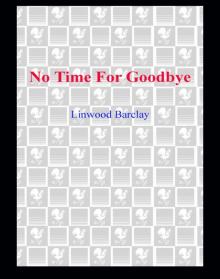 No Time for Goodbye
No Time for Goodbye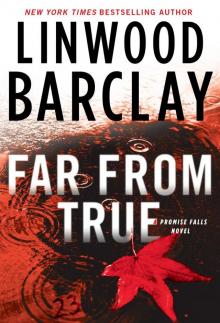 Far From True
Far From True Lone Wolf
Lone Wolf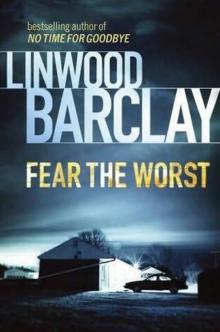 Fear the Worst
Fear the Worst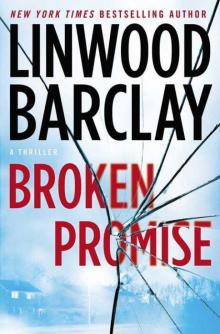 Broken Promise
Broken Promise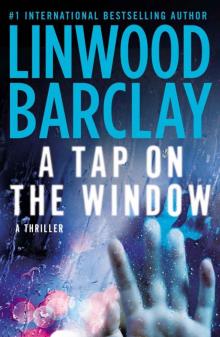 A Tap on the Window
A Tap on the Window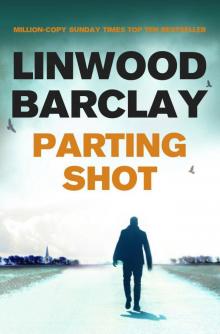 Parting Shot
Parting Shot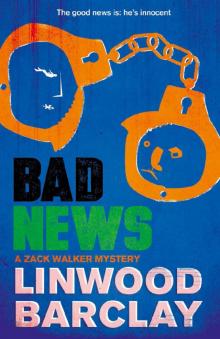 Bad News
Bad News Too Close to Home
Too Close to Home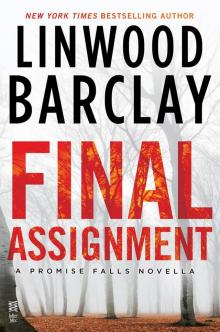 Final Assignment
Final Assignment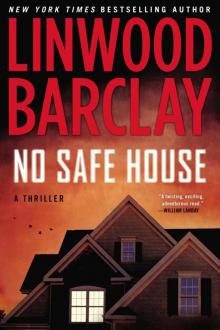 No Safe House
No Safe House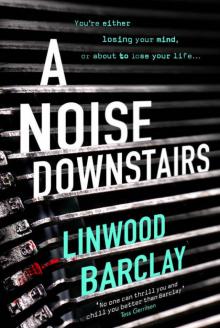 A Noise Downstairs
A Noise Downstairs Bad Guys
Bad Guys The Accident
The Accident Stone Rain
Stone Rain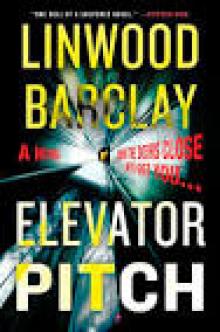 Elevator Pitch
Elevator Pitch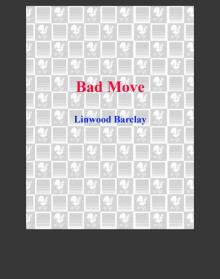 Bad Move
Bad Move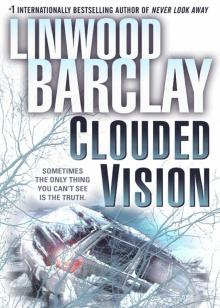 Clouded Vision
Clouded Vision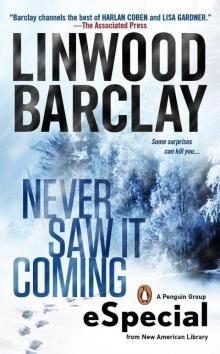 Never Saw It Coming
Never Saw It Coming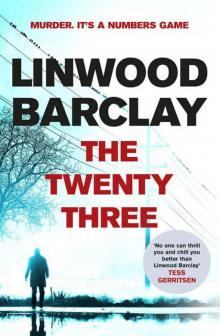 The Twenty-Three
The Twenty-Three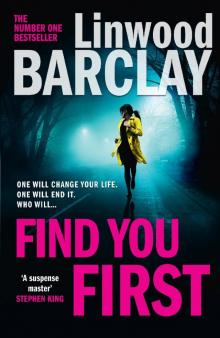 Find You First
Find You First Never Look Away
Never Look Away Elevator Pitch (UK)
Elevator Pitch (UK)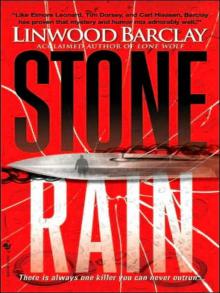 Stone Rain zw-4
Stone Rain zw-4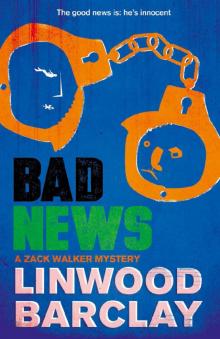 Bad News: A Zack Walker Mystery #4
Bad News: A Zack Walker Mystery #4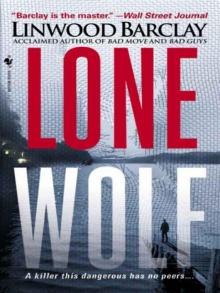 Lone Wolf zw-3
Lone Wolf zw-3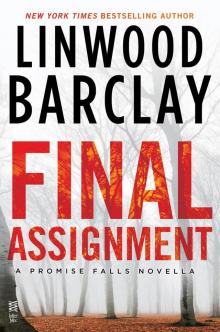 Final Assignment: A Promise Falls Novella
Final Assignment: A Promise Falls Novella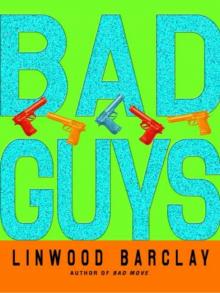 Bad Guys zw-2
Bad Guys zw-2 Never Saw It Coming: (An eSpecial from New American Library)
Never Saw It Coming: (An eSpecial from New American Library) Never Look Away: A Thriller
Never Look Away: A Thriller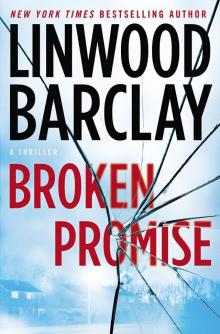 Broken Promise: A Thriller
Broken Promise: A Thriller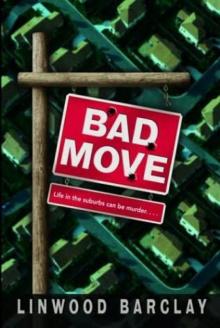 Bad Move zw-1
Bad Move zw-1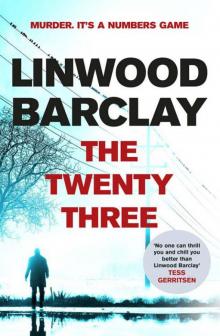 The Twenty-Three 3 (Promise Falls)
The Twenty-Three 3 (Promise Falls)